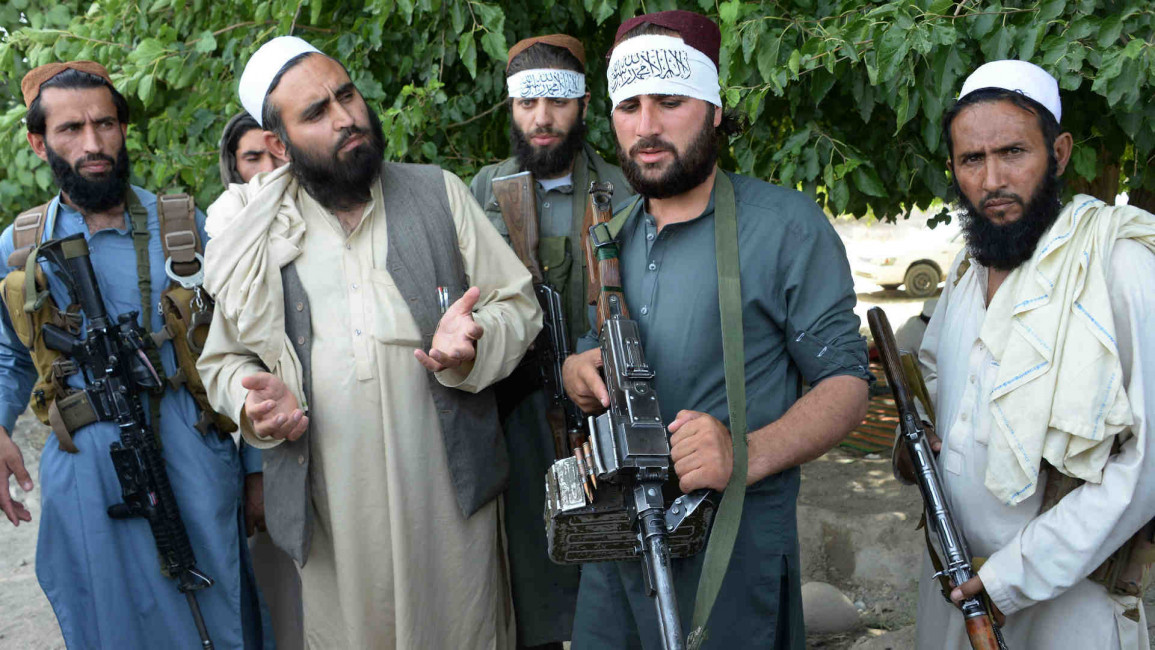No peace agreement agreed following US, Taliban talks
No peace agreement agreed following US, Taliban talks
The Taliban has said talks with the US did not end with an agreement on ending hostilities.
2 min read
The Taliban have rejected claims that peace is on the horizon [Getty]
Talks between the Taliban and US concluded without agreement on a ceasefire, sources from the movement have told news agencies, shattering hopes that the war in Afghanistan could be coming to an end.
The Taliban confirmed that three days of talks with US special envoy to Afghanistan Zalmay Khalilzad were held in Qatar, but did not end in agreement to cease hositilities.
Taliban spokesperson Zabiullah Mujahid denied reports that promising signs had emerged after the meeting between the two sides at the group's office in Doha.
"These were preliminary talks and no agreement was reached on any issue," he said.
Khalilzad said on Sunday that he hoped the war - which has been ongoing since the 2001 US-invasion of Afghanistan - could end by the time presidential elections begin next April.
But the Taliban were angered by a comment from Khalilzad that their movement had said it could "not win militarily", and so diplomacy is essential.
"We were astonished to see Khalilzad's statement in Kabul on Sunday. He wrongly quoted us, saying that the Taliban admitted that militarily we would not succeed," an Afghan Taliban source told Reuters.
US officials told Reuters that Washington hopes a new round of talks on the issue will take place before the year ends.
"The second round of talks went on for three days. This clearly proves that both sides are exercising patience and caution during their diplomatic engagement," a US official told the news agency on condition of anonymity.
The Taliban have refused to negotiate with the Kabul government, viewing it as a puppet regime for the US.
It is said to be demanding the phased withdrawal of foreign troops from the country and the release of senior Taliban figures.
Despite reaching out for peace talks, the Taliban has also intensified its attacks on government troops and controls roughly half the country.
A more dangerous Islamic State group affiliate is also operating in Afghanistan and has launched attacks mostly on civilian targets, particularly the country's Shia minority.
The US believes that military pressure on the group could force it to come to the negotiating table.
"We used the term stalemate a year ago and relatively speaking it hasn’t changed much, but... we do believe that the Taliban know that at some point they have to reconcile."
The Taliban confirmed that three days of talks with US special envoy to Afghanistan Zalmay Khalilzad were held in Qatar, but did not end in agreement to cease hositilities.
Taliban spokesperson Zabiullah Mujahid denied reports that promising signs had emerged after the meeting between the two sides at the group's office in Doha.
"These were preliminary talks and no agreement was reached on any issue," he said.
Khalilzad said on Sunday that he hoped the war - which has been ongoing since the 2001 US-invasion of Afghanistan - could end by the time presidential elections begin next April.
But the Taliban were angered by a comment from Khalilzad that their movement had said it could "not win militarily", and so diplomacy is essential.
"We were astonished to see Khalilzad's statement in Kabul on Sunday. He wrongly quoted us, saying that the Taliban admitted that militarily we would not succeed," an Afghan Taliban source told Reuters.
US officials told Reuters that Washington hopes a new round of talks on the issue will take place before the year ends.
"The second round of talks went on for three days. This clearly proves that both sides are exercising patience and caution during their diplomatic engagement," a US official told the news agency on condition of anonymity.
The Taliban have refused to negotiate with the Kabul government, viewing it as a puppet regime for the US.
It is said to be demanding the phased withdrawal of foreign troops from the country and the release of senior Taliban figures.
Despite reaching out for peace talks, the Taliban has also intensified its attacks on government troops and controls roughly half the country.
A more dangerous Islamic State group affiliate is also operating in Afghanistan and has launched attacks mostly on civilian targets, particularly the country's Shia minority.
The US believes that military pressure on the group could force it to come to the negotiating table.
"We used the term stalemate a year ago and relatively speaking it hasn’t changed much, but... we do believe that the Taliban know that at some point they have to reconcile."


![Minnesota Tim Walz is working to court Muslim voters. [Getty]](/sites/default/files/styles/image_684x385/public/2169747529.jpeg?h=a5f2f23a&itok=b63Wif2V)




![Debris near Rafic Hariri International Airport [Getty]](/sites/default/files/styles/image_330x185/public/2176162423.jpeg?h=a5f2f23a&itok=MCSK9mkM)
![An Israeli air strike on Jabalia killed teenage journalist Hassan Hamad [Screengrab/X]](/sites/default/files/styles/image_330x185/public/2024-10/hassan%20hamad1.jpg?h=c12e0b96&itok=Rd_dyCVp)
